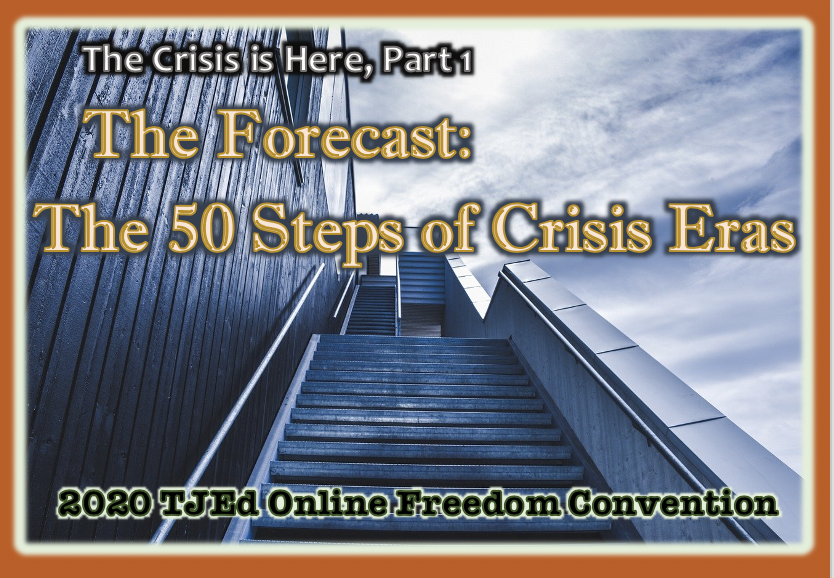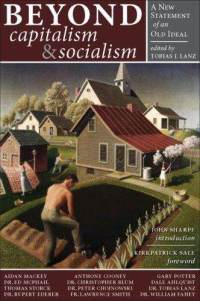The 2020 TJEd Online Convention is getting Rave Reviews!
April 6th, 2020 // 1:13 pm @ Oliver DeMille

Here’s what people are saying!
Many thanks to your whole family for all you do!
~ Jennifer Halverson
Watch the video trailer!
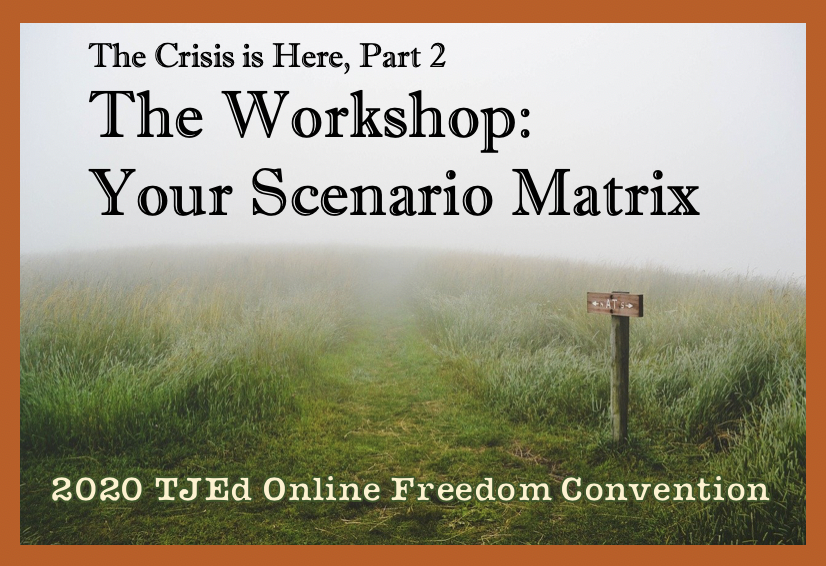 Listened to these talks in the convention today…I am speechless! I had chills the whole time I was listening! I’m excited to go back and do the planning section. Amazing how my perspective has changed so quickly. Going to have my husband listen, too. Thank you so much for this amazing resource!!!
Listened to these talks in the convention today…I am speechless! I had chills the whole time I was listening! I’m excited to go back and do the planning section. Amazing how my perspective has changed so quickly. Going to have my husband listen, too. Thank you so much for this amazing resource!!!
UPDATE: I just now worked through part of the matrix exercise. Wow, how powerful!
~ Rachael Breneman
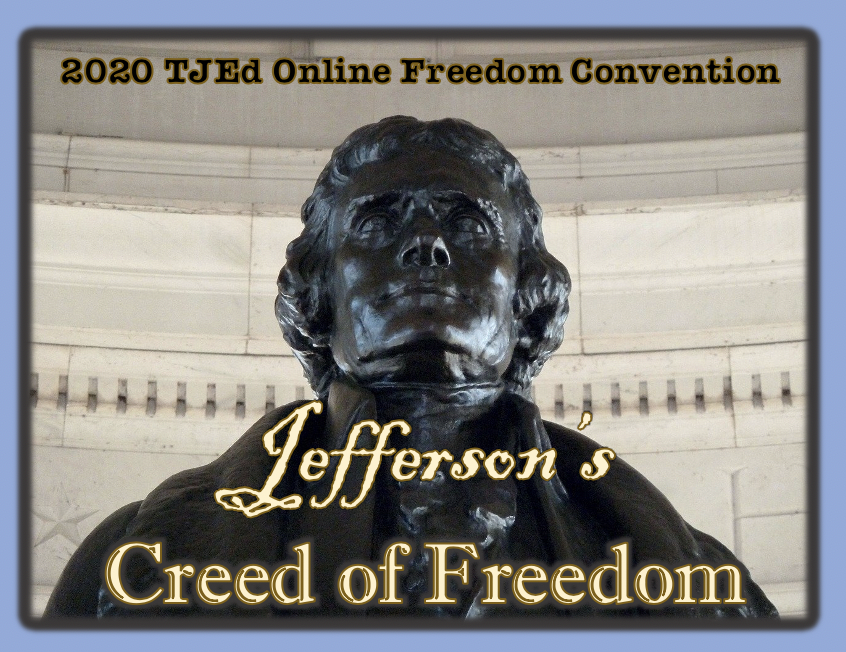 I just want to say thank you to you both. You have sacrificed so much for your mission and so many of us and our children have been blessed because of your sacrifice! I listened to The Crisis is Here part 2 from the 2020 Freedom convention today. On top of the wonderful exercise Oliver led and the incredible insight, I was also struck with how grateful I am that I have been so prepared for this moment.
I just want to say thank you to you both. You have sacrificed so much for your mission and so many of us and our children have been blessed because of your sacrifice! I listened to The Crisis is Here part 2 from the 2020 Freedom convention today. On top of the wonderful exercise Oliver led and the incredible insight, I was also struck with how grateful I am that I have been so prepared for this moment.
It is thanks in a large part to being mentored through TJEd that I have the family culture, understanding of turnings and history, life centered at home, classics on our shelves that teach us human nature, an appreciation for seasons and cycles and the confidence and ability to teach my family. While these times are uncertain, I don’t feel afraid or overly anxious. I’m actually looking forward to the next few decades and what “spring” will bring. I’m excited for my children and I to be a part of it!
~ Amy Updike
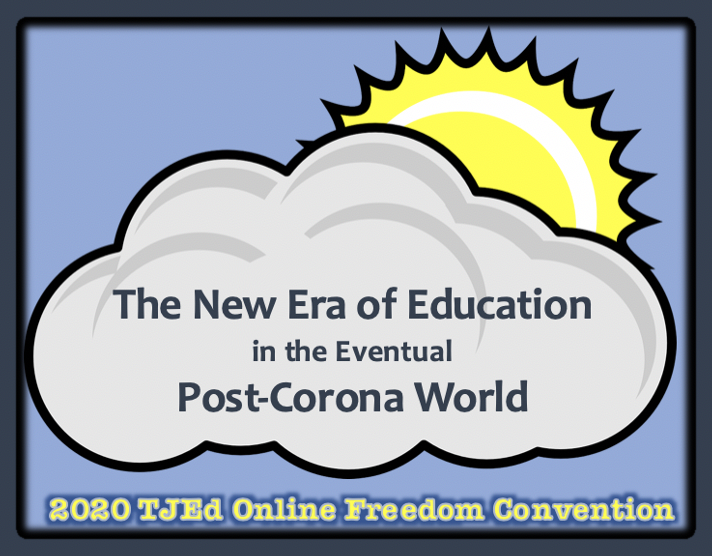 Before any of us realized what happened, the world changed, and it is very likely that for better or worse, nothing will be the same again.
Before any of us realized what happened, the world changed, and it is very likely that for better or worse, nothing will be the same again.
Now what?
I have learned a great deal from Oliver DeMille. The talks he has given already in this convention have really changed the way I am looking at what is happening right now, and he is just getting started.
If you want to know what to do to adapt to our new reality, I’d recommend signing up for this convention!
~ Colby Lyons
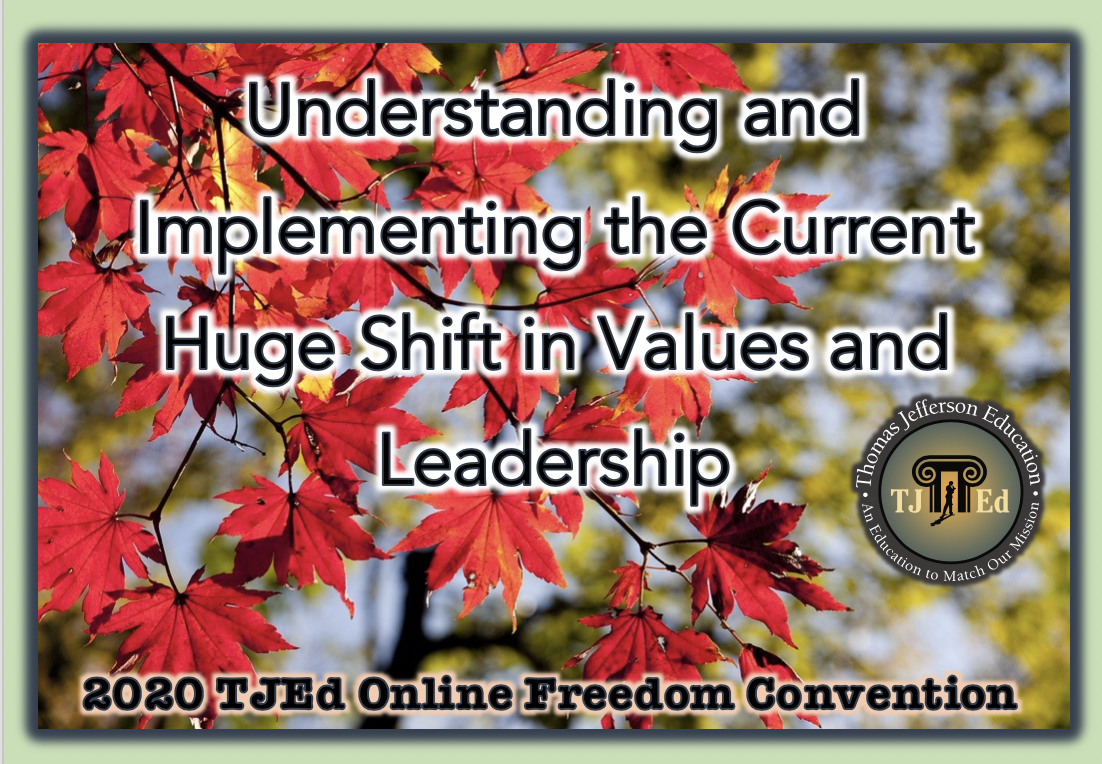 Oliver and Rachel, THANK YOU so much for this year’s convention! We just listened to the 2nd workshop and are so excited for this time in history!
Oliver and Rachel, THANK YOU so much for this year’s convention! We just listened to the 2nd workshop and are so excited for this time in history!
We’ve handled the crisis well because of our faith but this really got us pumped for our future!
My daughter, who is a senior, has struggled a little because she felt so uncertain of her immediate future.
Now, she’s happy and at peace that she is already on the right path to get through this crisis well. She loved the workshops so far! Can’t wait for the rest!
~ Kellee Clark
Watch the video trailer!
Join us for the 2020 Freedom Convention Here!
Special thanks to Lyle Mast of OR Sports for his contribution of 100 family scholarships!
And TJEd is matching that sponsorship to cover an additional 100 families!
If you need this assistance in order to participate in the convention, PLEASE don’t hesitate to request it; that’s exactly what it’s for, and we don’t want you to miss out!
Just click here to inquire and we’ll get you taken care of.
Category : Aristocracy &Blog &Business &Citizenship &Constitution &Culture &Current Events &Economics &Education &Entrepreneurship &event &Family &Featured &Generations &Government &History &Independents &Information Age &Leadership &Liberty &Mini-Factories &Mission &Politics &Producers &Prosperity &Statesmanship &Tribes
What is Freedom?
June 17th, 2013 // 10:38 am @ Oliver DeMille
I frequently get asked something along the lines of, “Oliver, you talk a lot about freedom; but what, exactly, do you mean by the word ‘freedom?’ How do you define it?”
It’s a very good question. To answer it, I first want to define “liberty.” After all, the Declaration of Independence boldly affirms that among our inalienable rights are “…life, liberty, and the pursuit of happiness.”
Actually, the key word in this sentence is “inalienable,” and everyone should read the excellent article by Kyle Roberts on what this word really means.
Liberty and freedom are similar, but they are slightly distinct, and understanding them both is essential in a society that is losing its freedoms.
Liberty
As for “liberty,” I define it as “the right to do whatever a person wants as long as it doesn’t violate the inalienable rights of anyone else.” Of course, in order to exercise liberty, a person needs to know what inalienable rights are—otherwise, he won’t know whether or not he is violating them.
Thus knowledge and wisdom are required to maintain one’s liberty, because a person who violates somebody else’s inalienable rights naturally forfeits his own liberty. The extent of this forfeiture is equivalent to the depth of the violation—when this is applied well, it is called justice.
License
License, as opposed to liberty, is defined as “the prerogative to do whatever a person wants or is able to do.” Note that this has often been used in history as an excuse to plunder, force or otherwise violate the rights of others. Thus license and tyranny are nearly always connected—the tyrant is tyrannical precisely because he takes license as he wills, and the person who pursues license eventually exerts tyranny of some kind.
Sometimes people pick one of the inalienable rights and use it to define “liberty,” such as: “Liberty is the right to do whatever a person wants as long as it doesn’t violate the property of another. Or … the life of another, etc. The problem with this type of definition is that though it is often accurate, it is also too limited. The violation of any inalienable right takes away one’s liberty.
Now that we have a definition of “liberty,” we can also define and compare the meaning of “freedom”:
Liberty: The right to do whatever a person wants as long as it doesn’t violate the inalienable rights of anyone else.
Freedom: A societal arrangement that guarantees the right of each person to do whatever he/she wants as long as it doesn’t violate the inalienable rights of anyone else.
“Liberty” comes from the Latin root liber though the French liberte, meaning “free will, freedom to do as one chooses … absence of restraint” (Online Etymology Dictionary). In contrast, the word “freedom” was rooted in the Old English freodom, which meant “state of free will; charter, emancipation, deliverance” (ibid). Thus liberty could exist with or also without government, but freedom was usually a widespread societal system that required some authority to maintain it.
In most eras of history, the goal is liberty, but it is almost never maintained without freedom. In other words, it is possible to have liberty without freedom, but in such cases it seldom lasts very long and it is usually only enjoyed by a limited few.
When freedom is present, however, liberty exists for all who don’t violate the inalienable rights of others.
What About Now?
This trip down memory lane has an important current application. A lot of people want liberty; in fact, nearly everyone desires liberty. But the only duty of liberty is to honor the inalienable rights of everyone else, and as a result liberty without freedom is fleeting.
In contrast, freedom requires many more duties, and therefore it musters much more from its people. It only succeeds when the large majority of people in a society voluntarily fulfill many duties that keep the whole civilization free.
To repeat: those who stand for freedom must honor the inalienable rights of all, and they must also take responsibility for standing up and helping ensure that society succeeds. No truly free government directs this free and voluntary behavior, but without it freedom decreases.
For example, one of the duties of those who support freedom is free enterprise—to take action that improves the society and makes it better. No government should penalize a person who does not do this (such penalties would reduce freedom), but overall freedom will decrease if a person has the potential to take great enterprises that improve the world, but doesn’t.
Thus freedom is very demanding. If people don’t voluntarily do good things, and great things, freedom declines. If they don’t exert their will and take risks to improve the world, freedom stagnates and decreases.
Freedom and Morality
Another way that people voluntarily increase freedom is by choosing morality. In societies where a lot of the people don’t choose a moral life, liberty may be maintained by some people but the freedom of all people eventually declines. When more people choose the path of virtuous living, freedom grows.
The same is true of charity and service. When more people choose it, freedom increases. There are a number of other ways people can voluntarily take actions that have a direct and positive impact on freedom. In the freest societies, a lot of the people choose to engage in many such behaviors.
When we pledge allegiance to the flag, we do so to promote “…liberty and justice for all.” This is the role of government—liberty and justice, or in other words the protection of inalienable rights and the providing of recompense if such rights are violated.
But while in free nations government is limited to this role, the people in a free society must do much more. If they all do their best, fully living up to their potential, freedom greatly increases.
In other words, the real question isn’t “What is freedom?” but rather “What is my role in freedom?”
The answer is different for each person, but the key is to not worry about how other people use their freedom. As long as they aren’t violating inalienable rights, they won’t hurt you. Your focus (and my focus, and each individual’s focus) should be, simply, “Am I living up to my full potential, my great life mission and purpose in this world?”
If your answer to this question is “yes,” you are a promoter of freedom and your efforts and projects will help increase freedom for everyone. If not, now is the time to get started…
Category : event &Featured &Foreign Affairs &Information Age &Liberty &Mini-Factories &Mission &Politics &Statesmanship &Technology &Tribes
19 Questions Answered in FreedomShift
August 13th, 2011 // 1:56 pm @ Oliver DeMille
- Following historical cycles and trends, we have recently experienced a significant recession and major unemployment. According to the patterns of history, what is the third major economic challenge which is just ahead? (Learn what it is so you can prepare for it before it comes.)
- Based on the lessons of past generations which faced major economic problems, what are the twelve things every family should do to deal with the economic challenges ahead?
- What are the three major choices which American citizens need to make to overcome our nation’s economic problems and restore economic growth and increased freedom?
- Where did Tocqueville say that the greatness of America lies? (The answer may surprise you.)
- What exactly is a FreedomShift and how is one accomplished?
- What is “the Law of the Vital Few?”
- How is this law drastically changing America today?
- What are the three top problems that are keeping America from fixing its problems right now?
- What are six predictions of the Anti-Federalists from the founding generation that have come true today and are causing major problems in Washington D.C.’s ability to lead the nation?
- Is our society being run by the cultures of our Elementary Schools, High Schools, Colleges & Corporations, Government Officials, or the Adults in our society?
- How can we move back to adult culture, especially in Washington?
- What are the three major groups in the Republican Party, the three major groups in the Democratic Party, and the other major groups running our nation politically?
(We are much more complex than the historical two-party system that dominated during the Cold War, and only those who understand these splits in the parties will know what is really going on in the nation.) - Who is the new group that is literally running the United States now? (Hint: it’s not the Tea Party, socialists, environmentalists, the religious right, liberals or even conservatives. The answer is surprising and deeply important.)
- What are the nine types of people who run both of the two major political parties?
- How will they impact the election of 2012?
- What should we expect in the upcoming election?
- What are the eight kinds of freedom, and which have we already lost in America?
- Which of the eight are we now losing?
- What does this loss mean directly for your family and the economy?
These challenges can be dealt with positively, but only if we know what is coming in the decade ahead.
For the answers to these questions and more on how “regular” people like you and me have all the power to refresh our liberties, read FreedomShift: 3 Choice to Reclaim America’s Destiny, available in paperback, pdf and Kindle editions. (Audiobook version, read by the author, coming soon!)
***********************************
 Oliver DeMille is a co-founder of the Center for Social Leadership, and a co-creator of Thomas Jefferson Education.
Oliver DeMille is a co-founder of the Center for Social Leadership, and a co-creator of Thomas Jefferson Education.
He is the co-author of the New York Times, Wall Street Journal and USA Today bestseller LeaderShift, and author of A Thomas Jefferson Education: Teaching a Generation of Leaders for the 21st Century, and The Coming Aristocracy: Education & the Future of Freedom.
Oliver is dedicated to promoting freedom through leadership education. He and his wife Rachel are raising their eight children in Cedar City, Utah.
Category : Aristocracy &Blog &Citizenship &Community &Culture &Current Events &Economics &Entrepreneurship &Featured &Government &Independents &Leadership &Liberty &Mini-Factories &Politics &Prosperity &Tribes
A New Call for Free Enterprise
June 22nd, 2011 // 1:13 pm @ Oliver DeMille
A review of Beyond Capitalism and Socialism: A New Statement of an Old Ideal, edited by Tobias J. Lanz
The message of this excellent book, Beyond Capitalism and Socialism, is straightforward and timely: both socialism and capitalism are lacking. But the book goes a step further, offering suggestions for what type of economy and society we should adopt in the twenty-first century:
“There must be a better way. And, of course, there is, and has been for a very long time. It is a society based on small self-sufficient regions, empowered communities, vibrant neighborhoods, gainfully employed families, individual self-satisfactions, decentralized politics, local economies, sustainable organic agriculture, cooperative work, environmental humility, and careful nurturing of the earth.”
The entire book outlines these basic ideals in a realistic and real-world, even anti-utopian, way.
First, it notes that through history humankind has faced on ongoing series of major crises. These are simply the reality of history. Every generation faces challenges, and some are bigger than others. We have enjoyed a period of relative peace and prosperity which is rare in human history. Crises of some kind will come, and at some point they will challenge or end the ability of big government to solve the world’s problems.
Second, the book argues that truly sustainable society depends on something more than dependence on big institutions:
“As James Kunstler puts it in The Long Emergency, when these [inevitable] crises hit, national and supranational economies will disintegrate and ‘the focus of society will have to return to the town or small city and its surrounding agricultural hinterland…’”
“’It will require us to downscale and rescale virtually everything we do and how we do it…’”
“’Anything organized on the large scale, whether it is government or a corporate business enterprise such as Wal-Mart, will wither as the cheap energy props that support bigness fall away.’”
This is an extremely important point. Towns and cities along with families could, and indeed should, at some point become once again the central institutions of human society. As a society, we have given far too little thought to this eventuality.
Third, if any or all of these changes—or others like them—occur, we will see our world drastically altered. Unfortunately, little of our modern schooling, scholarship, career training or leadership preparation is geared in any way to dealing with such a possibility.
“And then, of necessity, the world will reconstruct itself on the lines of a more human-scale, community-based, local-resource-dependent societies…”
I don’t know if this forecast will come as predicted here, but it certainly could. And if it does, we need leaders who are prepared. In fact, even if this prediction doesn’t occur, such an increase of leadership on local levels could only help our society. Even if our major institutions remain big, even global, strong local leadership is vital to success—economically, politically and on a societal level.
A Breakdown of Local Leadership
In fact, it is the breakdown of exactly this kind of local leadership, I believe, which has caused such drastic growth of institutions that are too big and such widespread dependence on these institutions. Any organization that is too big to fail is, put simply, too big. Period. If it is too big to fail, its failure is a major threat—because all man-made institutions eventually fail. Most do so earlier rather than later.
The authors of Beyond Capitalism and Socialism get it right that the answer to our major current problems are rooted in our citizens and community, and that until we build strong local foundations across society we can only expect to witness further economic decay. They are also correct that neither capitalism nor socialism hold the answers, that a return to true free enterprise is essential, and that we must get started in this process rather than wait for some crisis to force such changes.
At times the authors get caught up in denominational debates from the Catholic perspective, but this tends to deepen the benefit of the book rather than detract. Readers do not have to buy into any religious themes to learn from the numerous commentaries on the potential of free enterprise society.
The book is invaluable reading for American, and all freedom-loving, citizens. As one of the authors wrote:
“Given a society, in which men, or the vast majority of men, owned property and were secure in their income, the myriad interactions of free men making empowered choices really would balance supply and demand. We would be astonished at the variety, the non-servility, and the creativity of our neighbors.”
I am convinced that this is both true and, especially in our modern world, profound. Still, I found the book lacking in one major detail. I prefer the term “free enterprise” to “Distributive,” first because I think it more accurately describes the philosophy for which it stands and second because I’m not convinced that free enterprise and distributism are precisely the same thing. They share many ideals, it is true, but there are differences.
For example, both free enterprise and distributism agree that:
- neither capitalism nor socialism is the ideal
- capitalism, in which those with wealth are treated differently by the law than those without wealth and the level of one’s wealth determines which laws pertain to each person, is flawed
- socialism, in which the government owns the major means of production and levels incomes and work assignments in an attempt to create long-term equity between all citizens and where one’s status is determined by one’s government position, is flawed
- the local society, economy and government is more important than the state- or national-level economy and government and should be treated as such
- families are the central institution of society, and they are more important than markets or governments; markets and governments exist to help families, not vice versa
- money is an important consideration in making choices for family, career, business and society, but it is less of a priority than relationships, spirituality and morality
- we have reached a point in the modern world where our societal dependence on big institutions—both government and corporate—is a serious weakness in our culture and causes much that is negative in our world
- a return to society that is more ideal, more locally-oriented, and citizens that are more independent and entrepreneurial is overdue. In such a society, most families would own their own businesses rather than remaining dependent on government or corporations for their jobs and livelihoods
Free Enterprise and Distributism
The big difference between free enterprise and distributive thought hinges on how we should move toward such a society. Dale Ahlquist, one of the authors in Beyond Capitalism and Socialism, suggested the following:
“The dilemma of Distributism is the dilemma of freedom itself. Distributism cannot be done to the people, but only by the people. It is not a system that can be imposed from above; it can only spring up from below….If it happens, it seems most likely that it would be ushered in by a popular revolution. In any case, it must be popular. It would at some point require those with massive and inordinate wealth to give it up.”
The desire for popular support is normal for all political groups, but the idea that Distributism “would at some point require those with massive and inordinate wealth to give it up” is alarming at best. Why would the wealthy have to “give it up?” Why is that necessary in free society? The word “required” is the problem. Fortunately, Ahlquist clarifies that this would be voluntary, so it isn’t Marxist, but it still makes me wonder, Why?
Nor is this the isolated view of just one author. Here is how another of the authors put it (and for this author voluntarism is replaced by government force):
“For instance, if I own one or several stores (say pizza restaurants) I would have a reasonable and normal rate of taxation, but as soon as I begin to assemble a chain of such businesses, then my rate of taxation would rise so sharply that no one of a normal disposition would seek to continue to own such a chain….A similar scheme of taxation would attack ‘multiple shops,’ that is, stores selling many lines of goods, such as a mega or ‘box’ stores, and stores with ‘large retail power.’”
Again, the obvious question is, why? The answer is that no big institutions can be allowed, that everything must by force remain small. This makes the same mistake as Marx, who taught that government would take from the rich and redistribute equally to all. The mistake was to think that those running the government wouldn’t keep a little (or a lot) extra for themselves and their families. In the Distributive ideal, where no institution can be allowed to be too big, the clear flaw is that any institution powerful enough to keep all the others small will have to be, well, big.
That means big government. The Distributists would presumably want the government to be local, but strong enough to keep all the other institutions small. The American founders already dealt with this and wrote about it extensively in the Federalist Papers. Madison, for example, said that nearly all of the colonies in the late 1780s suffered from local governments that were too dominant—they nearly all had corrupt and anti-freedom practices. This was one of the strongest arguments in support of the U.S. Constitution: a central entity would help reduce oppressive, intrusive and unfair governing fads which always arise in small (and therefore inbred) governments.
Clearly government has become much too big today, but a return to locales dominated by a few powerful families that ignore the needs of the rest of the people is not the answer—though it is precisely what would happen to most local governments if left to themselves. History is clear on this point.
We certainly need more local leadership, independence and a lot more entrepreneurialism and real ownership. We need good local government to make it work, and ideally a federation of local governments to maintain real freedom.
Is Taxation the Answer?
But back to the main point: Why would we want to use government taxation to keep any business from growing? If it offers a good product at a good price and people prefer its offering to those of other businesses, why should we drastically increase its taxes so that it remains small? Is smallness the central point? If so, this is the reason I prefer free enterprise. One more quote will suffice to further my point:
“Of course, a suitable period of time would be necessary to complete an orderly sell-off of property from excessively large owners to small owners before the new tax system came into full effect. Moreover, if this is instituted at a very reasonable pace, with tax rates on concentrations of property increasing gradually each year, this would give owners more time to prepare and help prevent a ‘firesale’ of their property. Similarly some form of guaranteed loans would have to exist to allow those without property or money to purchase the excess property that was being sold.”
My first thought when I read this was, “Who gets to determine what ‘excess’ means in such a society? Whoever it is, they’ll eventually keep more of the money and power than everyone else.” This one flaw in how the book describes Distributism is a serious problem. It proposes stopping one capitalist from getting too much wealth and power, but it doesn’t seem to realize that it also proposes taking the “excess” money from the capitalist and giving it to the socialist.
In contrast, free enterprise takes a different route. It establishes good laws that treat the rich, middle and poor the same. Period. That is freedom.
Is the U.S. a Free-Enterprise Economy?
Some people may believe that this is the system we live under in the United States today. Such an assumption is incorrect. The U.S. commercial code has numerous laws which are written specifically to treat people differently based on their wealth.
For example, it is illegal for those with less than a certain amount of wealth to be offered many of the best investment opportunities. Only those with a high net worth (the amount is set by law) are able to invest in such offerings. This naturally benefits the wealthy to the detriment of wage earners. This system is called capitalism, and it is a bad system—better than socialism or communism, to be sure, but not nearly as good as free enterprise.
In a free enterprise system, the law would allow all people to take part in any investments. The law would be the same for all. If this seems abstract, try starting a business in your local area. In fact, start two. Let the local zoning commissions, city council and other regulating agencies know that you are starting a business, that it will employ you and two employees, and then keep track of what fees you must pay and how many hoops you must jump through. Have your agent announce to the same agencies that a separate company, a big corporation, is bringing in a large enterprise that will employ 4,000 people—all of whom will pay taxes to the local area and bring growth and prestige.
Then simply sit back and watch how the two businesses are treated. In most places in the United States, one will face an amazing amount of red tape, meetings, filings and obstacles—the other will likely be courted and given waivers, benefits and publicity. Add up the cost to government of each, and two things will likely surprise you: 1) how much you will have to spend to set up a small business, and 2) how much the government will be willing to spend to court the large business.
This is the natural model in a capitalist system. Capital gets special benefits. Apparently, in contrast, in Distributist society the small business would pay little and the big business would have to pay a lot more. Under socialism, neither business would be established at all—at least not by you. A government official would do it all, or not do it.
In free enterprise, the costs and obstacles would be identical for the two businesses. In free enterprise, the operative words are “free” and “enterprise.”
Some Distributists seem to share the socialist misconception that unless government forces smallness, every business owner will push to become too big. Wendell Berry, a favorite writer of mine, often took the same tone. In reality, however, the evidence is clear that American business and ownership stayed mostly small—with most people owning family farms or small businesses—until the 1960s. It was government debt which wiped out the farming culture that dominated the South and Midwest, and the rise of big corporations over family-owned businesses came after the U.S. commercial code was changed by law to a capitalist rather than a free-enterprise model.
Give Freedom a Try
Instead of using government to force businesses to remain small, let’s consider giving freedom a try. It has worked for us in the past. If we altered the laws at all levels so that government entities treated all businesses and citizens the same, regardless of their level of capital in the bank, the natural result would be the spread of more small businesses. Freedom, not government control, is the answer.
With all that said, I’m convinced that at least some, maybe many or most, of Distributists in general and the contributing authors to Beyond Capitalism and Socialism specifically would agree with this point, that in fact their view of Distributism coincides with free enterprise. For example, Ahlquist’s chapter appears entirely supportive of free enterprise.
Still, I am concerned by this one thread of thought among some of the authors that seems to see government as the way to keep business from growing. Free enterprise gives no special benefits to big business like capitalism does, but it also does not force businesses to remain small. If this is the view of most Distributists, I agree with them. Even if we disagree on this point (and I’m not certain that we do), I find much to praise in this excellent book.
Quotable Quotes
Beyond this one concern, I can’t say enough positive about Beyond Capitalism and Socialism. It is greatly needed by our citizens today. Everyone should read it and ponder its application to our current world. Consider the following thoughts from this thought-provoking book:
“Home and family are the normal things. Trade and politics are necessary but minor things that have been emphasized out of all proportion.” –Dale Ahlquist
“What then is Distributism? It is that economic system or arrangement in which the ownership of productive private property, as much as possible, is widespread in a nation or society. In other words, in a Distributist society most…would own small farms or workshops…” –Thomas Storck
“As Political Economy is the child of Domestic Economy, all laws that weaken the home weaken the nation.” –Joseph McNabb
“The family, not the individual, is the unit of the nation.” –Joseph McNabb
“We don’t want to work hard. We don’t want to think hard. We want other people to do both our work and our thinking for us. We call in the specialists. And we call this state of utter dependency ‘freedom.’ We think we are free simply because we seem free to move about.” –Dale Ahlquist
“The conservatives and liberals have successfully reduced meaningful debate to name-calling. We use catchwords as a substitute for thinking. We know things only by their labels, and we have ‘not only no comprehension but no curiosity touching their substance or what they are made of.’” –Dale Ahlquist
“The real purpose of traveling is to return. The true destination of every journey is home.” –Dale Ahlquist
“[T]oday here in the United States of America, and in all industrialized countries…there is a class of men and women, perhaps the majority, that…is unfree….I mean, all those who subsist on a wage, the price paid for the commodity they have and who have no other means of maintenance for themselves and their families. I mean…all those who subsist on a wage that is paid to them by those who are, in actuality, their masters; a wage that may be withdrawn at any time and for any reason, leaving them on the dole, or to starve, if they can find no new job…These are not free men in any rational and exact sense of the word.” –Ralph Adams Cram
“Every man should have his own piece of property, a place to build his own home, to raise his family, to do all the important things from birth to death: eating, singing, celebrating, reading, writing, arguing, story-telling, laughing, crying, praying. The home is above all a sanctuary of creativity. Creativity is our most Godlike quality. We not only make things, we make things in our own image. The family is one of those things. But so is the picture on the wall and the rug on the floor. The home is the place of complete freedom, where we may have a picnic on the roof and even drink directly from the milk carton.” –Dale Ahlquist
“The word ‘property’ has to do with what is proper. It also has to do with what is proportional. Balance has to do with harmony. Harmony has to do with beauty….The word ‘economy’ and the word ‘economics’ are based on the Greek word for house, which is oikos. The word ‘economy’ as we know it, however, has drifted completely away from that meaning. Instead of house, it has come to mean everything outside of the house. The home is the place where the important things happen. The economy is the place where the most unimportant things happen.” –Dale Ahlquist
“Caveat lector! For there is little resemblance indeed of the real ownership of real property…to the ‘rent-from-the-bank’ home ‘ownership’ (sic) of most American families.” –John Sharpe
“Our separation of economy from the house is part of a long fragmentation process….Capitalism has separated men from the home. Socialism has separated education from the home….The news and entertainment industry has separated originality and creativity from the home, rendering us into passive and malleable customers rather than active citizens.” –Dale Ahlquist
“In the age of specialization we tend to grasp only small and narrow ideas. We don’t even want to discuss a true Theory of Everything, unless it is invented by a specialist and addresses only that specialist’s ‘everything.’” –Dale Ahlquist
“In material things there can be no individual security without individual property. The independent farmer is secure. He cannot be sacked. He cannot be evicted. He cannot be bullied by landlord or employer. What he produces is his own: the means of production are his own. Similarly the independent craftsman is secure, and the independent shopkeeper.
No agreements, no laws, no mechanism of commerce, trade, or State, can give the security which ownership affords. A nation of peasants and craftsmen whose wealth is in their tools and ski and materials can laugh at employers, money merchants, and politicians. It is a nation free and fearless. The wage-earner, however sound and skilful his work, is at the mercy of the usurers who own that by which he lives.
Moreover, by his very subjection he is shut out from that training and experience which alone can fit him to be a responsible citizen. His servile condition calls for little discretion, caution, judgment, or knowledge of mankind. The so-called ‘failure of democracy’ is but the recognition of the fact that a nation of employees cannot govern itself.” –John Sharpe
Whether you agree or disagree with the details, this book is a treasure of great ideas to consider, discuss, ponder and think about. We need this book today, and we need a society that has read it and deeply contemplated its numerous profound concepts.
Whether or not the ideas in Beyond Capitalism and Socialism become necessary to all of us through some major crisis ahead, a national consideration of these topics is long overdue. We do need to move beyond capitalism and socialism. We need a rebirth of free enterprise, for our nation, economy, freedom, prosperity and above all, for our families and communities.
***********************************
 Oliver DeMille is a co-founder of the Center for Social Leadership, and a co-creator of Thomas Jefferson Education.
Oliver DeMille is a co-founder of the Center for Social Leadership, and a co-creator of Thomas Jefferson Education.
He is the co-author of the New York Times, Wall Street Journal and USA Today bestseller LeaderShift, and author of A Thomas Jefferson Education: Teaching a Generation of Leaders for the 21st Century, and The Coming Aristocracy: Education & the Future of Freedom.
Oliver is dedicated to promoting freedom through leadership education. He and his wife Rachel are raising their eight children in Cedar City, Utah.
Category : Blog &Book Reviews &Economics &Entrepreneurship &Featured &Government &Liberty &Mini-Factories &Producers &Prosperity &Tribes
A Battle Ahead
June 18th, 2011 // 11:16 am @ Oliver DeMille
A review of The Origins of Political Order: From Prehuman Times to the French Revolution by Francis Fukuyama
Francis Fukuyama’s recent book is an excellent commentary on the history of politics and the underpinnings of our current political systems. Readers may find things to disagree with in a book that covers so many periods of history, but this well-researched work sparks a lot of deep thinking about important and timely topics.
Three Major Advancements
Ultimately, Fukuyama sees the development of political society from tribal through modern times as the result of three major advancements. The future, he suggests, belongs to societies that maintain and effectively institutionalize all three of these organizational advantages. This view flies in the face of some widespread views, but Fukuyama’s arguments are compelling.
Consider, for example, the following likely characteristics of the decades immediately ahead:
1. The invention of centralized governments which allowed societies to grow beyond families and small tribes
The industrial age created an expectation (especially in the British and American worlds) of “sustained intensive economic growth.” Today we feel entitled to unending economic expansion. Any downturn in the economy is seen as a reason to blame our political leaders. We seem to believe that a high level of consistent economic growth is our birthright.
This is a significant development. Never has a generation in the past held such expectations. No longer are citizens content with the up-and-down economic cycle that has characterized all of history. Whether this new expectation can be maintained remains to be seen, but this is our expectation now, and we’ll continue to punish any government official who doesn’t both promise and deliver sustained economic growth.
If it turns out that constant growth is unrealistic, that there really is a natural economic cycle of ups and downs, we’ll consistently elect and then dump every politician from every party—the voters will never be satisfied. With such feelings of entitlement, we’re destined to be perpetually angry at and disappointed with our government.
Globalization has created a world of independent international elites and locally-dependent middle and lower classes.
“In the days when most wealth was held in the form of land, states could exercise leverage on wealthy elites; today, that wealth can easily flee to offshore bank accounts.”
2. The establishment of “uniform laws that apply to all citizens
This is a world-altering event in human history. The advent of widespread human freedom and prosperity came as a result of uniform laws that applied to all citizens—regardless of status, wealth, race, gender, ability or religion. Globalization trumps all this, allowing a global upper class to operate largely above the law while the masses are required to follow the laws of their local nations.
The economic benefit of being in the upper class under such an arrangement is huge—the gap between rich and poor will drastically increase as this reality grows.
Hardin Tibbs wrote:
“The proportion of people in cities is growing rapidly, and the numbers of people left in the countryside are falling. The sprawling urban megacity—somewhere like Sao Paulo, where you’ve got densely populated shantytowns right next to the enclaves of the super-rich—is a growing phenomenon around the world.” (EnlightenNext, Issue 47, 2011, pp 29-41)
3. The creation of governments which are “accountable to their constituents
Two groups will be the winners in the new system: mostly the mobile global upper class, and secondarily the masses in nations where the government is truly accountable to the people. This will impact nations around the globe, as we are already witnessing in the Arabic world.
For China, this is either good news or really bad news. If China’s government remains unaccountable to the people, its economic and military strength will at some point become a weakness. If, on the other hand, the Chinese government reforms and becomes accountable to the people, China may well become the great superpower many have predicted.
According to Fukuyama, the centralized structure of an authoritarian system can seem to “run rings around a liberal democratic one” for a time, because the leaders face little opposition from checks, balances, or other obstacles to their decisions. But this is a frailty if ever the leaders make bad decisions.
A few bad leaders or choices can bring down such a system very quickly. Societies with effective checks and balances on the centers of power are more resilient and less prone to huge decline in a single generation or even decade.
As for the United States and Europe, they must reverse the decades-old trend of centralizing power away from the people.
In short, we are seeing the rise of a global class system with increasing divisions between the haves and the have-nots. Major characteristics of this new reality include the unrealistic expectation of constant economic growth, a global upper class that is increasingly above the laws of nations, the growth of drastically divided cities, and governments that are widely controlled by the wealthy.
One great battle of the 21st Century will likely be about who controls government, the wealthy class or the people as a whole. As Fukuyama shows, through history the nations where government was accountable to the people ultimately achieved the most social success, freedom and prosperity.
The Origins of Political Order is the first of a two-volume set, and hopefully the second volume will tell us more about how the people can win this coming battle.
As the mathematical cosmologist Brian Swimme wrote: “the universe is not a place, it’s a story…” (EnlightenNext, Issue 47, 2011, pp. 52-63) The same can be said of the 21st Century, and our story will likely hinge on whether government is ultimately accountable to the people or to a small group of elites.
This is an old battle, but this is the first time it is global in scale. The challenges are thus increased and the stakes are high.
***********************************
 Oliver DeMille is a co-founder of the Center for Social Leadership, and a co-creator of Thomas Jefferson Education.
Oliver DeMille is a co-founder of the Center for Social Leadership, and a co-creator of Thomas Jefferson Education.
He is the co-author of the New York Times, Wall Street Journal and USA Today bestseller LeaderShift, and author of A Thomas Jefferson Education: Teaching a Generation of Leaders for the 21st Century, and The Coming Aristocracy: Education & the Future of Freedom.
Oliver is dedicated to promoting freedom through leadership education. He and his wife Rachel are raising their eight children in Cedar City, Utah.
Category : Aristocracy &Blog &Book Reviews &Business &Community &Economics &Tribes

